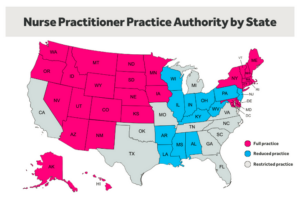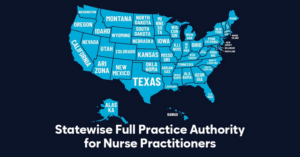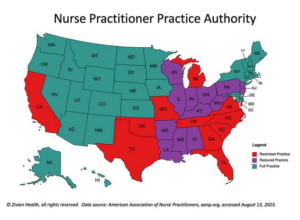Nurse Practitioner Practice Authority: A State-by-State Guide
 In numerous states, the legislative landscape governing the roles of Nurse Practitioners (NPs) is undergoing changes.
In numerous states, the legislative landscape governing the roles of Nurse Practitioners (NPs) is undergoing changes.
This comprehensive guide explores Nurse Practitioner Practice Authority, detailing the scope of practice for nurse practitioners, and outlining the different levels of practice authority.
Understanding how NP Scope of Practice varies across states is crucial for anyone pursuing a career as a nurse practitioner.
As NP legislative changes continue to reshape healthcare, this guide helps you navigate these transformations and their impact on your career.
What is Nurse Practitioner Scope of Practice?
The term “scope of practice” refers to the professional activities that nurse practitioners are authorized to perform in each state. NP Scope of Practice can include a variety of tasks such as assessing patient conditions, ordering and interpreting tests, making diagnoses, prescribing medications, and managing treatments. The NP professional activities that are allowed, however, are not the same everywhere. In some states, nurse practitioners must work under physician supervision, while in others, they have more autonomy and can practice independently.

Struggling to meet your deadline?
Get your assignment on Nurse Practitioner Practice Authority: A State-by-State Guide done by certified MDs and PhDs in the USA. ORDER NOW!
Understanding Nurse Practitioner Practice Authority: Full, Reduced, and Restricted
Nurse Practitioner Practice Authority is categorized into three levels: Full Practice Authority, Reduced Practice Authority, and Restricted Practice Authority. These levels define the extent to which nurse practitioners can operate independently in their roles.
- Full Practice Authority
In states with full practice authority, NPs can perform the full range of duties, including diagnosing, prescribing, and managing treatments, all without the need for NP supervision requirements or collaboration with a physician. These states allow nurse practitioners to work independently, establishing their own practices. Examples of Full Practice Authority NP states include Alaska, Arizona, and Colorado, where NPs can practice without restrictions. - Reduced Practice Authority
In reduced practice authority states, nurse practitioners can carry out many aspects of their job but are limited in certain areas. For example, they might need to collaborate with a physician to prescribe certain medications or to manage complex conditions. While NPs in reduced practice for nurse practitioners have more independence than those in restricted states, they still face some supervision requirements.
- Restricted Practice Authority
In restricted practice authority states, NPs are required to work under the direct supervision of a physician. They can perform many tasks independently, such as diagnosing or prescribing in some cases, but they must always work under the oversight of a physician, which can limit their autonomy.
Full Practice Authority for Nurse Practitioners
Full Practice Authority allows nurse practitioners to work without the need for supervision or collaboration with a physician. This level of authority is most common in NP states like California, New York, and Oregon. In these states, nurse practitioners can function as independent healthcare providers, diagnosing patients, prescribing medications, and managing patient care without external oversight. Independent nurse practitioner practice is fully supported in these regions, which helps address gaps in primary care availability.
Reduced Practice Authority: What Does it Mean for Nurse Practitioners?
Reduced practice authority for nurse practitioners means that they may have some limitations on their practice, particularly around areas like prescribing certain medications or operating independently. However, in these states, NPs can still manage many aspects of patient care. For example, in reduced practice NP states, nurse practitioners might be able to diagnose conditions and order tests but must collaborate with a physician for other activities like prescribing controlled substances.
Restricted Practice Authority: Nurse Practitioners Under Supervision
Restricted practice authority states impose the most significant limitations on nurse practitioners. In these states, NPs cannot practice independently and must always work under physician supervision. These states typically restrict the ability of NPs to perform certain functions or prescribe medications without approval. Restricted practice authority NP states include states like Alabama and Mississippi, where NPs face the most supervision requirements.
State-by-State Breakdown of Nurse Practitioner Practice Authority
State Nurse Practitioner regulations vary across the country, and understanding how your state defines NP Scope of Practice is essential for anyone considering a career as an NP. The state-by-state breakdown of NP practice authority provides detailed information on whether a state grants full practice authority or imposes reduced or restricted practice conditions. For example, some states with Full Practice Authority like Oregon and Washington allow NPs to work without a supervising physician, while others may require a collaborative agreement or supervision.
Full Practice Authority States/Territories
Connecticut
Massachusetts
New Hampshire
New Mexico
North Dakota
Northern Mariana Islands
Rhode Island
South Dakota
Washington
Washington, D.C.
Reduced Practice Authority States
American Samoa
Mississippi
New Jersey
Pennsylvania
Puerto Rico
U.S. Virgin Islands
West Virginia
Restricted Practice Authority States
California
North Carolina
South Carolina
Recent Changes in Nurse Practitioner Practice Authority Legislation
 Changes in NP practice authority legislation are ongoing, with more states considering expanding the autonomy of nurse practitioners. For example, Utah recently signed Senate Bill 36 into law, granting full practice authority to nurse practitioners. Similarly, California and Pennsylvania have introduced bills that expand the scope of practice for NPs, allowing them more independence in diagnosing and treating patients. Keep an eye on NP legislative changes in your state, as these laws can impact your practice and career opportunities.
Changes in NP practice authority legislation are ongoing, with more states considering expanding the autonomy of nurse practitioners. For example, Utah recently signed Senate Bill 36 into law, granting full practice authority to nurse practitioners. Similarly, California and Pennsylvania have introduced bills that expand the scope of practice for NPs, allowing them more independence in diagnosing and treating patients. Keep an eye on NP legislative changes in your state, as these laws can impact your practice and career opportunities.
Explore Top-Ranked Nurse Practitioner Programs
To succeed in the evolving landscape of nurse practitioner roles, a solid education is essential. Top nurse practitioner programs offer specialized training to prepare you for NP certification and licensing. Whether you’re interested in becoming a Family Nurse Practitioner (FNP) or pursuing another Advanced Practice Registered Nurse (APRN) track, attending a reputable program will help you meet NP licensing requirements and position you for success in the NP job market.
Advocating for Full Nurse Practitioner Practice Authority
Advocacy plays a key role in expanding NP practice authority. As more states push for Full Practice Authority for nurse practitioners, healthcare access and quality improve, especially in underserved areas. Supporting the movement for NP autonomy ensures that more patients can receive timely, cost-effective care. If you’re passionate about advocating for nurse practitioner autonomy, consider joining professional organizations that promote NP legislative advocacy and fight for policy changes to expand practice authority.
Explore Top-Ranked Nurse Practitioner Programs
To obtain detailed information about the commencement dates, policies on credit transfers, availability of financial assistance, and more, connect with the universities provided below.
Advocating for Comprehensive Practice Authority
The movement toward expanding the authority of Nurse Practitioners (NPs) heralds numerous advantages for healthcare consumers. This initiative not only enhances accessibility to healthcare providers capable of diagnosing and treating health conditions but also addresses the shortage of family practitioners. Furthermore, owing to the generally lower salaries of nurse practitioners compared to physicians, it facilitates the delivery of cost-effective care.
Despite these advantages, concerns have been raised, particularly by physician organizations. They are apprehensive that conditions that should be diagnosed and treated by physicians might be handled by NPs. There are also fears that healthcare payers, particularly insurance companies, might pressurize healthcare providers to choose NPs over physicians, potentially compromising the quality of care and outcomes for patients with complex or serious health conditions.
Physicians, who stand to earn more by supervising NPs, may lose a significant revenue source if NPs are granted the ability to practice independently. Despite these concerns, the trend toward full practice authority states is rapidly growing, indicating that state legislators believe in the positive impact of expanding NP practice authority. To engage in the advocacy for NP full-practice authority, refer to our comprehensive advocacy guide.
Recent Developments in NP Practice Authority Legislation
- In a significant move, Utah Governor Spencer Cox signed Senate Bill 36 into law in March 2023, expanding the scope of practice for nurse practitioners in the state. This action makes Utah the 27th state to adopt full practice authority for NPs.
- In November 2022, California’s nurse practitioner association approved rules allowing for an expanded scope of practice for NPs in the state. Starting January 2023, NPs with three years of clinical practice in California will be authorized to work without contractual physician supervision in healthcare settings with at least one practicing physician or surgeon on staff. This enables qualified nurse practitioners to consult a physician if necessary.
- In February 2021, Pennsylvania introduced State Bill 25, which includes measures to expand the scope of practice for certified NPs. The bill is currently pending.
- As of July 1, 2020, under HB 607, advanced practice registered nurses in Florida who have completed 3,000 hours under the supervision of an MD or a DO in the last five years can apply for an unrestricted license.
- In 2018, South Carolina removed the previous requirement that collaborating or supervising physicians be located within a 45-mile radius of the NP’s practice and increased the number of NPs that a physician can supervise or collaborate with from three to six.
Frequently Asked Questions About Nurse Practitioner Practice Authority
How does nurse practitioner authority vary by state?
Each state establishes the laws governing nursing scope of practice. In full practice authority states, NPs can establish independent practices. In other states, NPs may need to work under a physician or with a physician, though they can otherwise diagnose and treat patients without limitations. Some states limit certain NP functions, such as prescribing medications.
In what states can an NP practice independently?
Currently, Alaska, Arizona, Colorado, Connecticut, Delaware, Florida, Hawaii, Idaho, Iowa, Kansas, Maine, Maryland, Massachusetts, Minnesota, Montana, Nebraska, Nevada, New Hampshire, New Mexico, New York, North Dakota, Oregon, Rhode Island, South Dakota, Utah, Vermont, Washington, and Wyoming are full practice authority states. However, this list is likely to grow as more states consider legislation to expand NP authority.
Are NPs licensed by state?
All nurses, including NPs, are licensed by the state in which they practice or by a multi-state license. State boards of nursing establish the criteria for becoming licensed. These criteria include graduating from an accredited program and passing a certification examination, as well as maintaining licensing through continuing education.
Where are NPs able to practice independently?
Currently, NPs can now practice independently in 27 states and in Washington, D.C. In other states, while NPs may perform many of their job functions with a high level of independence, they must work in collaboration with or under the supervision of a physician. For any further inquiries or additional information, feel free to reach out.
How does nurse practitioner authority vary by state?
The scope of practice for nurse practitioners varies greatly between states, with some offering full practice authority, where NPs can practice independently, while others impose restricted or reduced practice authority.
In what states can an NP practice independently?
Currently, NP full practice authority states include Alaska, Arizona, and Colorado, among others. These states allow nurse practitioners to practice without a supervising physician.
Are NPs licensed by state?
Yes, all nurse practitioners are licensed by the state in which they practice. NP licensing requirements typically include completing accredited education programs, passing certification exams, and fulfilling ongoing continuing education.
How Nurse Practitioner Practice Authority Affects Healthcare Access
Expanding NP practice authority has significant implications for healthcare access. In states with full practice authority, nurse practitioners can offer primary care services independently, which is especially crucial in rural or underserved areas where there is a shortage of physicians. Nurse practitioner autonomy also helps improve healthcare accessibility, allowing patients to see qualified providers without delay.
Challenges and Benefits of Expanding Nurse Practitioner Authority
While expanding NP practice authority can improve healthcare access, it also presents challenges. Some physician groups worry about the potential risks of NPs diagnosing and treating complex health conditions without the same level of training as physicians. However, the benefits of full practice authority include improved access to care, reduced healthcare costs, and more efficient use of healthcare resources, making it a compelling option for many states.
Key States That Have Expanded NP Practice Authority in 2024
States with full practice authority continue to grow as more legislation is passed to grant nurse practitioners autonomy. As of 2024, Utah and California have joined the list of states that have expanded NP practice authority, offering more opportunities for independent practice. Other states are considering similar moves, which may lead to even more career opportunities for nurse practitioners in the near future.
By understanding these distinctions and the ongoing NP legislative changes, you can better navigate the dynamic role of nurse practitioners in healthcare and the evolving landscape of NP licensing and scope of practice regulations.

Dont wait until the last minute.
Provide your requirements and let our native nursing writers deliver your assignments ASAP.


 Guam
Guam